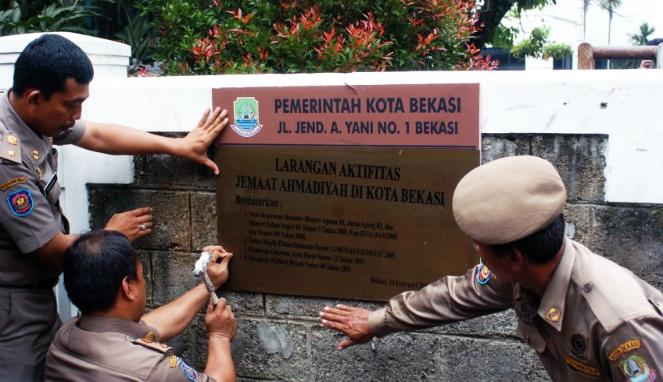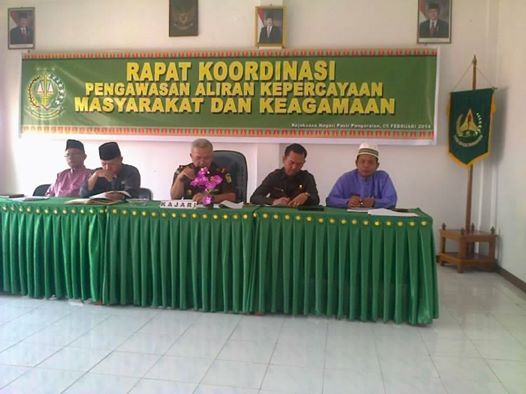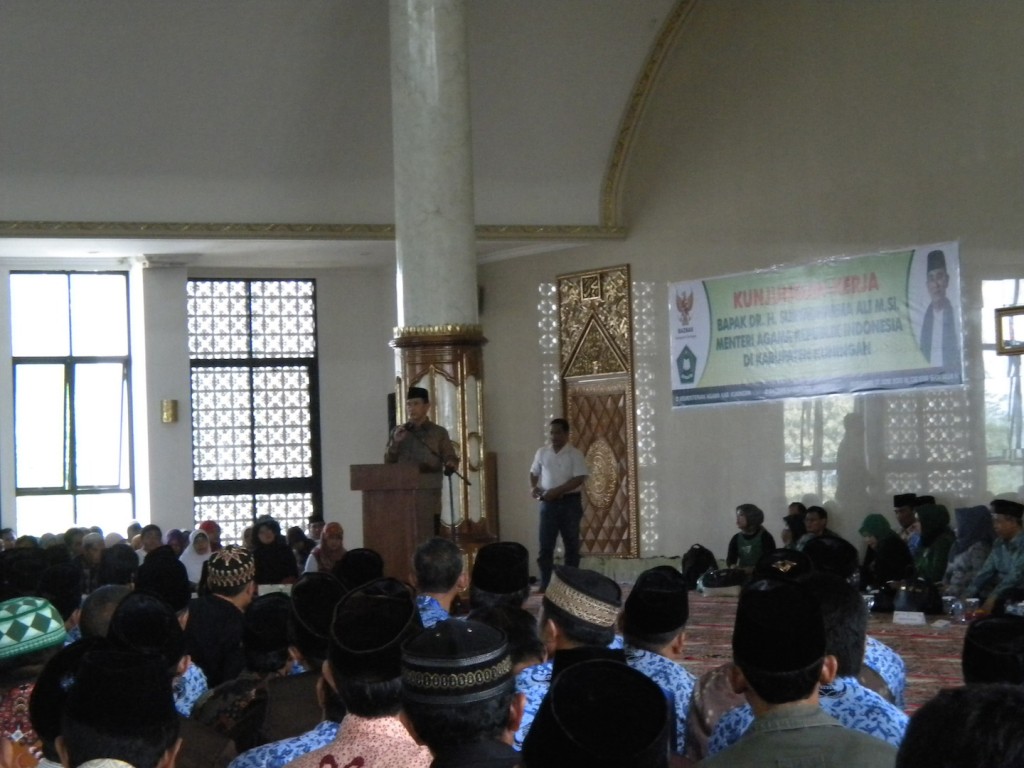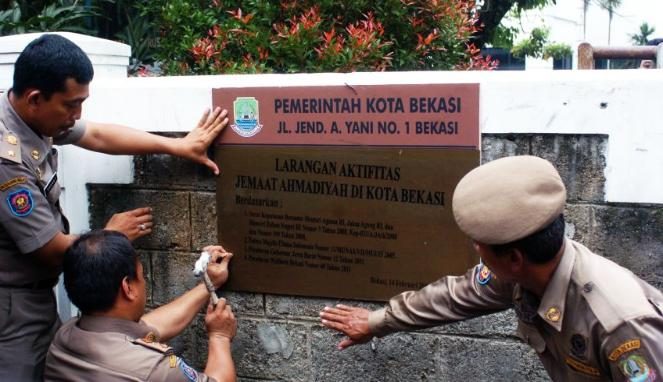
City officials hang a sign on the Ahmadiyah mosque that reads “a ban on the activities of the Ahmadiyah community in the city of Bekasi”. Photo credit: Antara
Earlier this month, municipal government officials once again sealed the entrance to an Ahmadiyah mosque in Bekasi, on the outskirts of Jakarta.
The mosque had previously been closed in February 2013, and had been at the center of the debate about the role of Ahmadiyah worshippers in Indonesia. While Sunni and Shia Muslim believe that Prophet Muhammad is the final one of Islam’s 25 prophets, Ahmadis – who also consider themselves Muslims – believe that there is another prophet after Muhammad, namely Mirza Ghulam Achmad, born 14 centuries after Muhammad. Mirza Ghulam Achmad founded Ahmadiyah. In the last few years in Indonesia, the difference between minority and majority Muslims has resulted in acts of intolerance, including efforts to prevent Ahmadis from practicing their faiths or attending their houses of worship.
Under President Susilo Bambang Yudhoyono attacks of religious intolerance have increased and have been marked by hardline religious groups and the failure to protect and prevent such acts by the state.
I argue that no future president, neither Joko Widodo nor Prabowo Subianto, will be able to reduce the prevalence of acts of religious intolerance unless the State ideology Ketuhanan Yang Maha Esa (The Belief in the Divine Omnipotence) is revised. Ketuhanan Yang Maha Esa recognizes six mainstream religions – Islam, Protestantism, Catholicism, Hinduism, Buddhism and Confucianism – at the expense of other non-mainstream faiths, such as Judaism, Shia, Ahmadiyah and traditional folk religions (such as Kaharingan as professed by Dayak tribe in Kalimantan).
The ideology has affected the entire architecture of the state, from the structure of the major organs of the state and its ministries to the tiny capillaries of state regulation, organization and policy-making. It starts at the top. For instance, the Ministry of Religious Affairs has established five directorate generals in line with the five mainstream religions (Islam, Protestant, Catholic, Hindu and Buddhist–a Confucianism directorate general is in progress). The ministry has omitted establishment of similar offices that cater to the needs of adherent of other religious faiths (for example, the needs to improve religious education for children of non-mainstream faiths). Hence, the policy deprives the rights of the latter to gain the equal treatment.
Nationwide, school curricula are tailored only to meet the needs of students following the mainstream religions. The government formulates religious curricula for students following the mainstream faiths (Islam, Protestant, Catholic, Buddhism, Hinduism and Confucianism), and hires teachers needed to ensure the students are taught well in the subject. However, similar services are not provided for students of non-mainstream faiths.
In the 1950s, the Coordinating Body to Monitor Mystical Beliefs (Bakorpakem) was initially established to monitor only ‘mystical beliefs’, but in recent years, their scope of work has expanded to monitoring religious denominations accused of sparking social disturbance, including Ahmadiyah.

A newly established Bakorpakem in Riau meets with police, military, intelligence and local government officials to, as the sign reads ‘monitor social and religious belief communities’. Photo credit: Riau office of Indonesia’s Department for Religion.
Bakorpakem includes State security officials, such as representatives from police, the military, State intelligence agency and the State prosecutor’s office. It’s structure unfolds from the central office in Jakarta to each of Indonesia’s districts and sub-districts.
Its monitoring of Ahmadiyah, especially in Manislor village of West Java province, intensified in the post-New Order era as violent incidents increased between 2002-2010. Anti-Ahmadiyah groups, who became more vocal after the demise of authoritarian regime of Soeharto in 1998, accused Ahmadiyah of being heretical and then often staged protests that frequently led into vandalism against Ahmadiyah houses and mosques.
While the State brought the perpetrators to court, Bakorpakem officials also concurrently persuaded Ahmadis to conform to Sunni belief, arguing that conversion would reduce social tensions. These attempts have been largely unsuccessful as Ahmadis are convinced of their fundamental right to practice their belief.
At the local level, the religiousity of the state apparatus is rampant. During my seven months fieldwork last year in East Java and West Java provinces, I found that security and bureaucracy officials frequently address religious conflict by persuading and coercing adherents of Ahmadiyah and Shia to convert to mainstream Sunni faith. These officials argue that the conflicts arise from a difference in faiths, and the problem will dissipate when minorities conforming to the faiths of the majority.
On June 17, 2013, I attended an event held in Islamic Center in Kuningan regency where the Ministry of Religious Affairs Suryadharma Ali oversaw the religious conversion of dozens of Ahmadis into Muslim Sunni.
At the event, the then Minister for Religion, Suryadharma Ali, praised efforts by the Ministry’s Kuningan office to support the conversion of the Ahmadis, and pledged significant funds for the livelihoods of the ex-Ahmadis after they had left the Ahmadiyah congregation. This event was the climax of a decade of persecution. Earlier, throughout the 2000s, the Ministry of Religious Affairs invited the local Ahmadis to participate in pembinaan (briefing) sessions.

Then Minister of Religious Affairs, Suryadharma Ali, gives a speech before local civil servants and residents and dozens of newly-converted ex-Ahmadis. The event was held on June 17, 2013 in At Taufiq Mosque, Kuningan Islamic Center, Kuningan regency. It is not the first of its kind attended by the Minister. On May 20, 2013, the Minister oversaw a similar event organised by his ministry’s Tasikmalaya regency office, also in West Java province, where dozens of Ahmadis in stated that they resigned from Ahmadiyah congregation and chose to convert into Muslim Sunni. Photo credit: A’an Suryana
The Ahmadis attended the first event, but after they learned that the event was designed “to guide Ahmadiyah back into true teaching of Islam”, they refused to respond to subsequent requests, commenting that the event was not pembinaan, but pembinasaan (extermination).
In 2005, Kuningan Regent Aang Hamid Suganda issued a joint government decree that warned the Ahmadis to refrain from conducting religious activities that deviated from mainstream religious belief, and if the Ahmadis failed to cease such activities, Suganda threatened to hand the matter over to the police.
When I interviewed Suganda in 2013, he defended his actions by arguing that he “had to issue the decree; otherwise, my people – the Ahmadis – will be victims (of violence perpetrated by anti-Ahmadi groups).” The decree was issued after increasing tensions between anti-Ahmadiyah groups and the Ahmadis.
Apparently, the Regent was under intense pressure to issue such a decree to ally the fears of anti-Ahmadiyah groups whose protests they feared would turn violent. He went on to say: “….On the other side, by issuing the decree, the people of Kuningan will believe that I have done real things.”
In separate interview, Achidin Noor, a long-time activist with the Kuningan’s MUI, acknowledged that the anti-Ahmadiyah joint decree issued by central government in 2008 (SKB) was quite effective in “muffling” reactions from anti-Ahmadiyah groups.
The Regent was also responsible for attempts to seal off Ahmadiyah mosques in Manislor village of Kuningan regency in 2008 and 2010, but the maneuvers were short-lived due to strong resistance from the Ahmadis, who made up the village majority. In Mansilor, about 70 percent of total 4,500 residents in the village are Ahmadis.
Early this month in Bekasi, East Jakarta, the local administration drew on a similar argument to close Ahmadiyah’s al Misbah mosque. The Bekasi government claimed that the measures aimed “to protect Ahmadiyah adherents” from imminent physical harm by parties demanding the mosque’s closure. The mosque – which is one of 362 Ahmadiyah mosques across the Indonesian archipelago – was built in 1998 and has 400 members who practiced their faith peacefully, until in 2011 when Islamic Defender’s Front (FPI), a hardline Muslim Sunni organization, demanded the local government seal off the mosque.
Bowing to FPI’s pressure, the Bekasi municipal government ordered its public order agency to erect zinc fences to isolate the mosque from other residential houses in the densely populated area, and then to lock the mosque entrance gate.
The Ahmadiyah Central Board (Jemaat Ahmadiyah Indonesia) brought the Bekasi case to administrative court last year (2013), and although they won, they lost in the appeal, allowing government officials to re-seal the entrance gate on May 17.
Public debate on the state of religious tolerance in Indonesia has fixated on the role of individuals like SBY and hardline religious groups such as FPI in failing to protect religious minorities or fomenting inter-religious tensions. However, a focus on individuals and groups rather than a structural approach detracts from the long-term, central role of the state in sidelining and discriminating against religious groups.
In this light, it’s important that we examine the state’s ideology towards frequent acts of intolerance. As I argued earlier, the State’s ideological construct (Ketuhanan Yang Maha Esa) guides central state processes of bureaucratization, legalization and organization towards the legitimation of religious intolerance. The result is that the state apparatus gives little space for non-mainstream faiths to practice their belief on the grounds that the latter’s existence were considered “less legitimate” within the State’s social, legal and politic edifice based on that ideological construct.
The behavior is not exclusive to Ahmadiyah case, but it is well-entrenched in the established practices of how the State apparatus manages religious affairs. Even if a future Indonesian president with pluralistic views is elected, he will have a problem addressing such acts of intolerance.
……………
A’an Suryana is a PhD candidate at School of Culture, History and Language (CHL) at Australian National University, researching the Indonesian state and religious violence. He is also a lecturer at the Swiss German University (SGU), Serpong, Banten province.
 Facebook
Facebook  Twitter
Twitter  Soundcloud
Soundcloud  Youtube
Youtube  Rss
Rss 